A Love Affair with Portland…Not me!
For as long as I’ve known him, H has loved the parish of Portland in Jamaica. My dad too… as a young army officer back in the 60’s when he first came to Jamaica from Grenada, he said he used to go to Portland at any chance he got. Portland reminded him of Grenada, he said. Having lived in Grenada for a bit during my childhood, I understand where he is coming from. Portland is green, rain-foresty, hilly, humid and has beautiful beaches. My attitude towards Portland though has always been “I can take it or leave it.” Meh. And I had a particularly bad experience when we were just married and had spent a weekend at Goblin Hill. I got the worst ever case of gastroenteritis that put me out of commission, and painfully so for a whole week! I suspect there was an unconscious coupling of Portland with gastro in my mind that didn’t create any yearning within for that parish.
Ambassabeth, Winnifred and Me
So when H announced that he wants to retire there, I pushed back with: “Enjoy! Yuh nah carry me out deh fi drop dead!”. He knew better than to push back. Think Eminem’s line: “…when a tornado meets a volcano…” But he’s also very smart. I have to believe that he hatched a plan to make me fall in love with Portland. It started with him organising a weekend at Ambasabeth cabins in the John Crow Mountains. He KNOWS that I live for drive outs…anywhere…and that it was somewhere new, in the hills, he had to know that I’d jump at the chance to go. What I didn’t bargain for was a weekend that did more than provide an opportunity to live like a pioneer (sort of) and walk some historic trails.
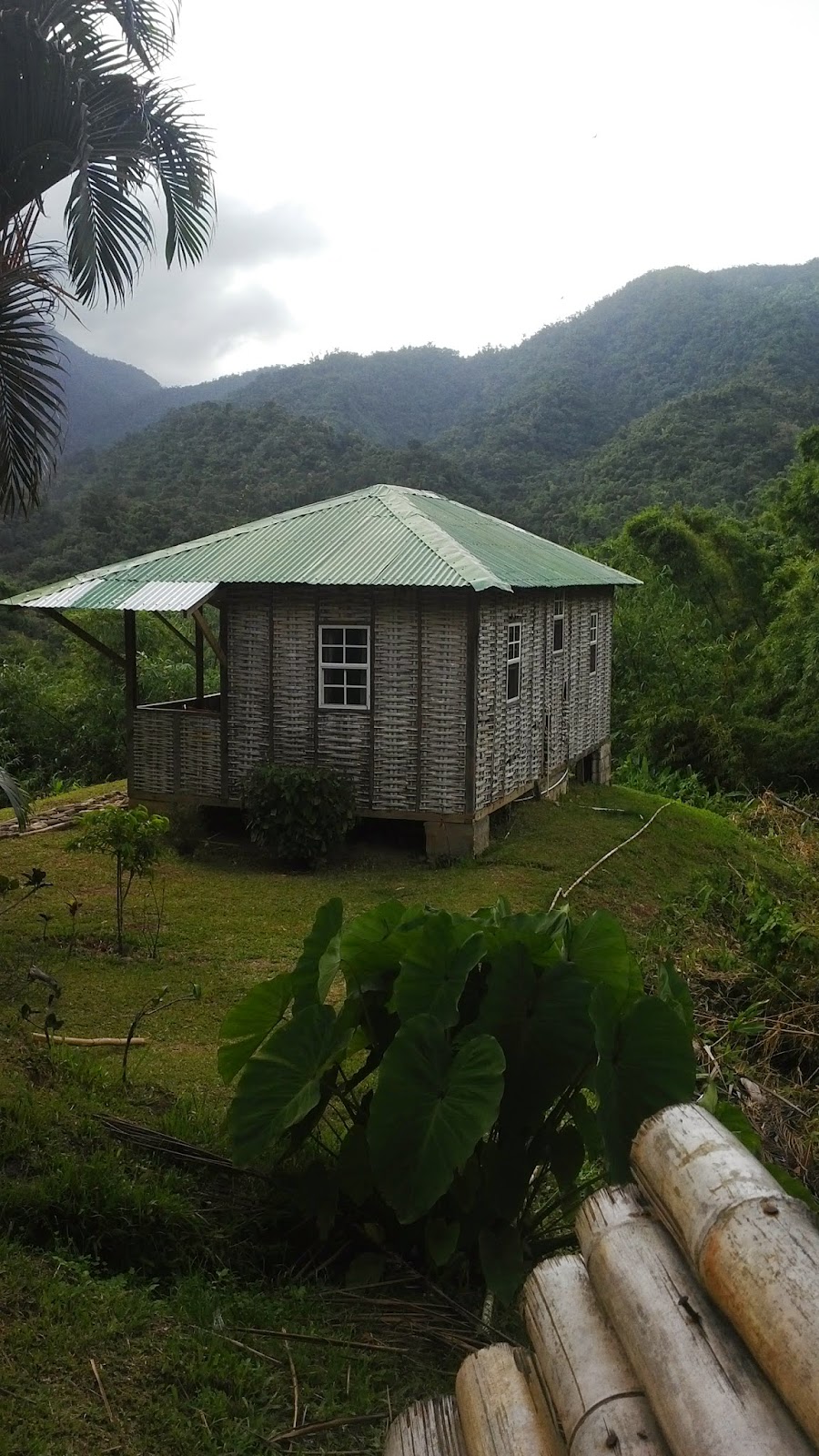 |
| A cabin at Ambassabeth |
In retrospect I can see him smiling smugly and pumping his internal fist when I waxed warm for MONTHS after that weekend about how struck I was by the community that we became part of for those few days. Part Next of his plan included repeat visits to Frenchman’s Cove beach. I am an unrepentant beach baby. My soul re-centers and I feel all the cares of the world slip away, like a shirt slipping off my shoulders with each lap of the waves, each gentle gust of sea breeze… or is that the rum? Whatever! I live for the beach. And Frenchman’s Cove, with its beautiful garden setting, its pristine, blue river with white sandy bottom (not dark and pebbly like other rivers) undulating lazily into the small bay that is Frenchman’s Cove is how I imagine the Garden of Eden.
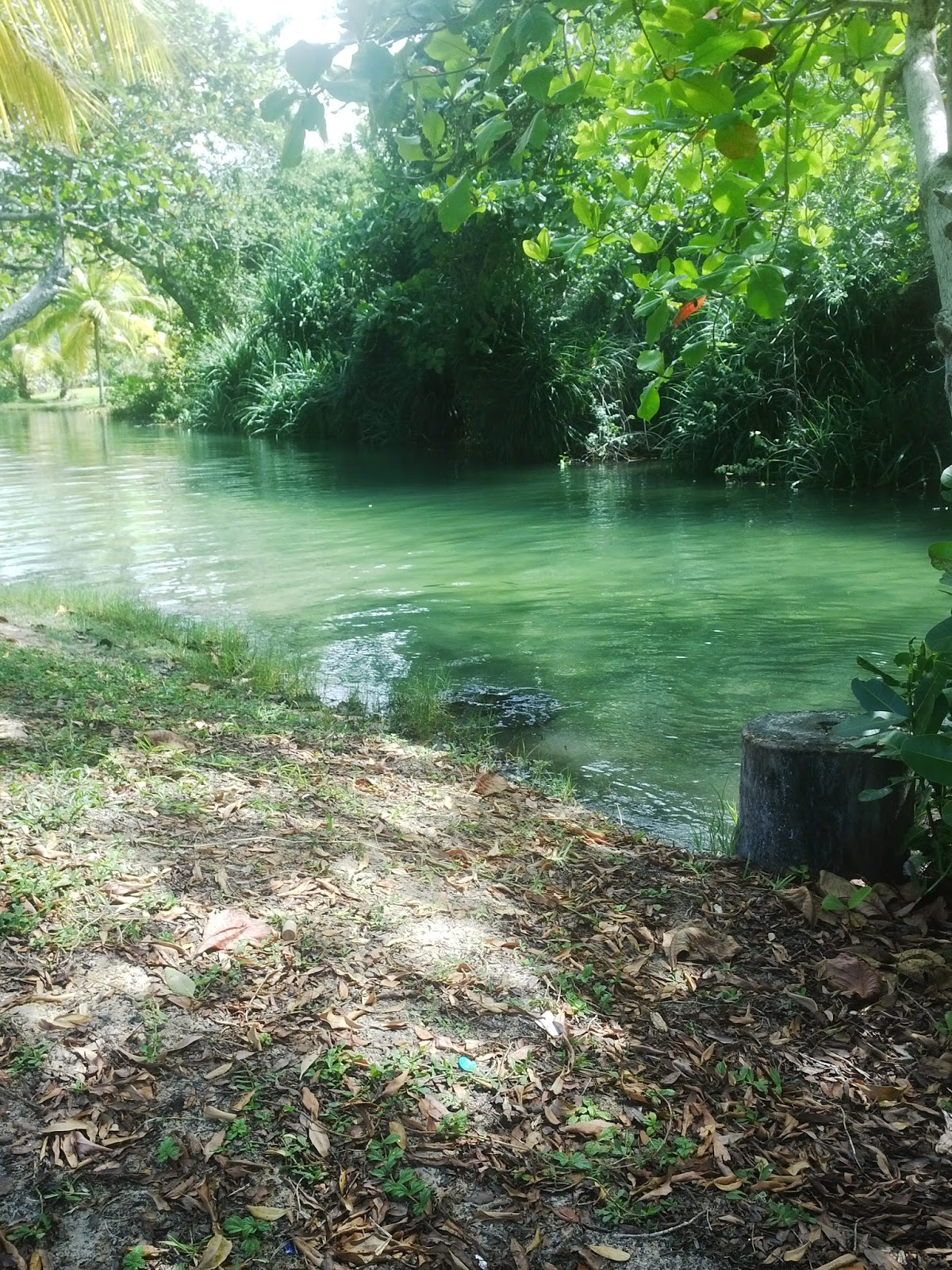 |
| The river at Frenchman’s Cove
|
The last visit there was with family and friends and we reluctantly dragged ourselves back to Kingston after a perfect day,but not before I snapped this sunset.
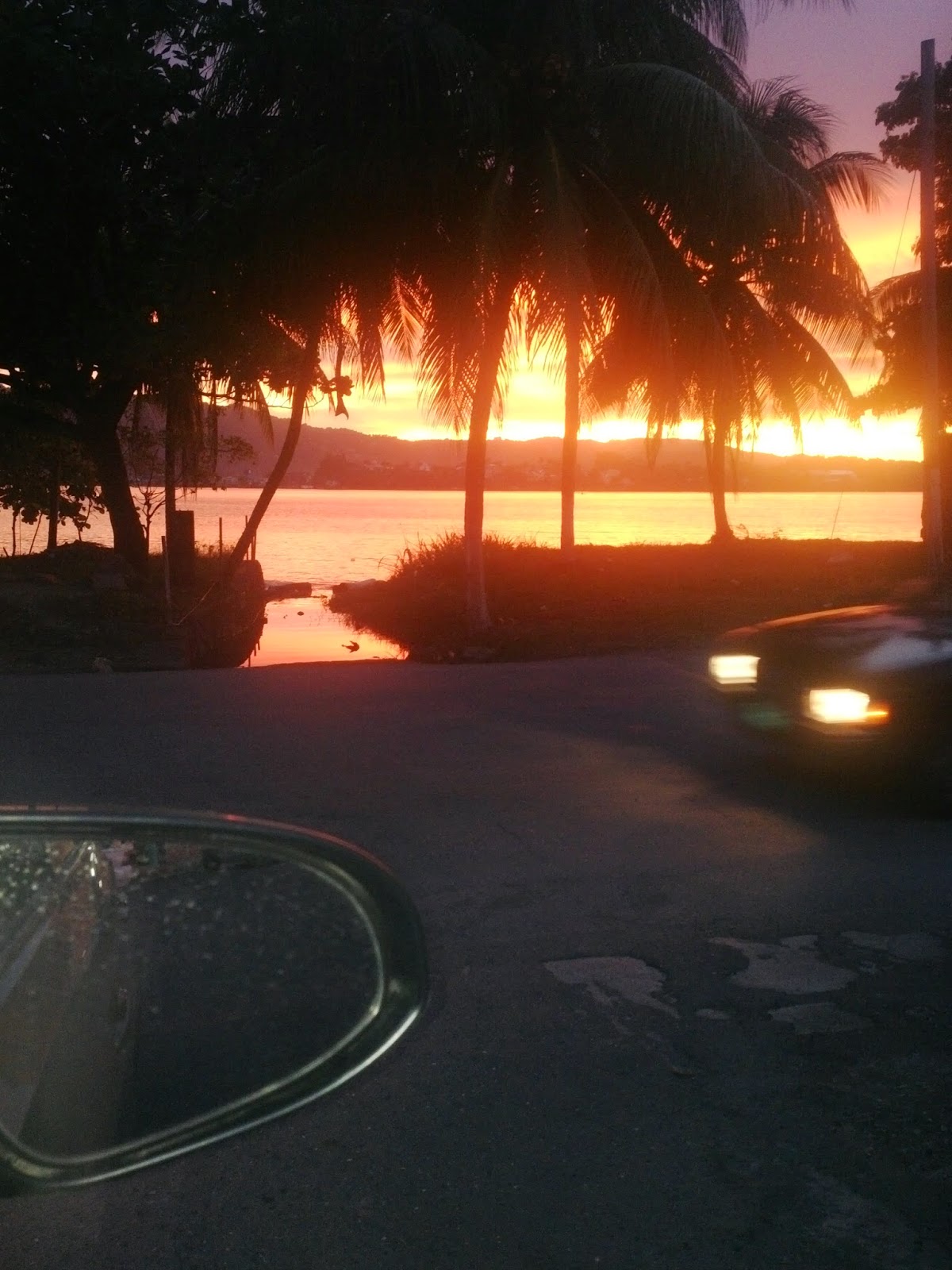 |
| Portand Sunset |
I think this marked my turning point. He didn’t have to do much convincing to get me back there a mere 3 days later. “Just a drive out, me and you alone…” was all he had to say. Hook. Line. Sinker.
I don’t think even he could have planned what happened next. We ended up, not part of the script at all, at Winifred Beach….
the last piece of beach out of the control of the UDC. I was in for yet another encounter with the people of Portland that would impact me in a very powerful way. Both the Ambassabeth and Winnifred experiences inspired
this article.
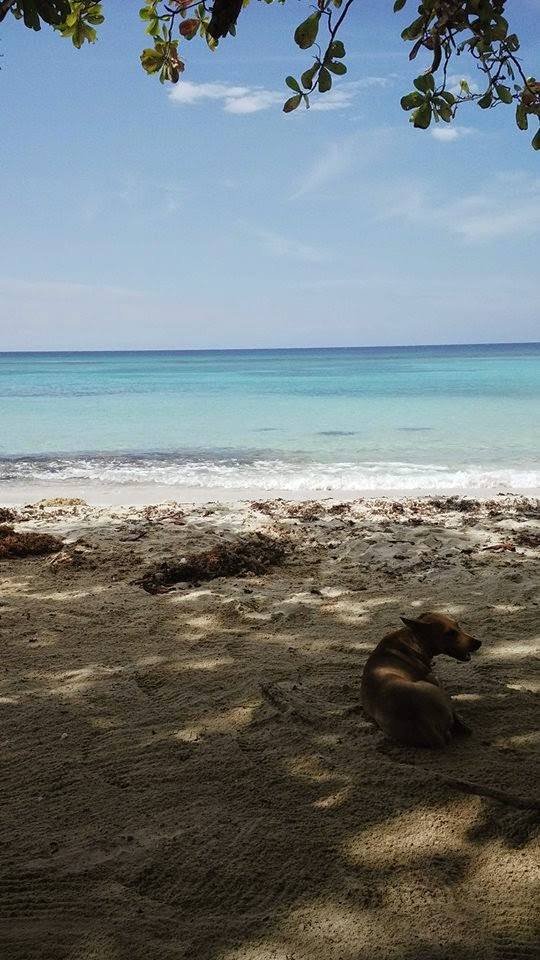 |
| Paradise aka Winnifred Beach
|
A change of Heart
So now I no longer scoff when he reverently and lovingly speaks of Portland. I’m falling in love with her too. There’s something about Portlanders, be they Maroons or regular folk. They are open, pleasant, independent and friendly. They don’t hustle you, they certainly don’t beg, they don’t wait on government and they have an easy vibe and an apparent ability to self-manage. They are possessed of the traits needed in communities around this island if we are ever to make this rotten, corrupt leadership that we have at the national level redundant and truly answerable to us. I’m serious.
At his (brilliant!) suggestion, we left the kids at home and just headed east, to Portland. We trampoosed in the hills above St. Margaret’s Bay and enjoyed the magnificent views of the Rio Grande emptying itself into the Caribbean Sea below. We descended and continued to drive east…past San San, past Boston and into Long Bay. The rough emerald sea there always calms me down. We climbed the highlands looking down into that area. How amazingly beautiful! Reluctantly we eventually headed back the way we came, but there was a not-so-short detour up into Nonsuch. How did we end up there…hmmm…
How we ended up in Nonsuch that #SundayinPortland
H had come across this bass guitar tutorial video by Devon Bradshaw on YouTube. He actually persuaded me to watch it with him, so taken was he with the magic that is the bass guitar in reggae music. He went on to explain to me that this video was one of about 15 short vignettes on YouTube on the Reggae in The Ruff channel. He was utterly taken by what he saw there and tried to tell me about it. What I heard was that H was impressed with a group of Rasta men up in hills and bush of Portland, in a district called Nonsuch (I had at one time heard of Nonsuch Caves…never been though) that lived off the land and created reggae music. I asked him if they were like the Jolly Boys. I had seen the Jolly Boys live before and I enjoyed them. He was at pains to describe his impression of the music coming from these men at Nonsuch:
“It’s like mento, but with more soul.”
In trying to drum up some interest within I said:
“Rasta men, in the bush must mean ital food. Find out where they are and let’s go eat up some good ital food.” Me: forever keeping it 100. Yup. Mi nuh buisness wid no box bass strumming and roots and culture chanting. Me want food.
So on this excursion sans children, H decided to find these men… Johnnie Walker and the Disappointers was what he told me their name was. I was skeptical. I had never heard of them. Did ER even feature them? Not that I know of. But hey…I wasn’t driving, I had nothing to do but to be present on the drive and it was all good with me! So he located the turn-off to Nonsuch and proceeded up into the hills. He stopped to confirm that we were on the right track with a man working on his car on the side of the road.
“Yean Man. Dis a di way. Just gwaan drive straight up. Yeah man, mi know Johnnie Walker dem. But it far enuh!!”
HUH? When country people tell you that somewhere is far, BELIEVE THEM! Their standard response is “Naw man…just roun’ di corner!”
I saw H hesitate, but before he could chicken out, the same man said “See da cyar deh ? Follow it. Dem a go straight a Nonsuch. Dem know where fi find Johnnie” Too. Damned. late. In for a penny, in for a pound. So we drove. We drove some more. And still we drove some more. The silence in the vehicle was punctuated only two times with H declaring: “Mi ah go turn back now”. I must confess that I found his discomfort amusing, and so I did what any supportive wife would do: I egged him on! H is a very self-contained, self-sufficient, in-control man, that hates uncertainty. So seeing him out of his comfort zone by not knowing where he was going or when he would get there was not something I was ready to see come to an end.
“But you’ve come so far already. We can’t turn back now. Plus look how beautiful this country is. Drive on! You have gas? Good. Mek wi drive!”
Johnnie Walker and the Disappointers
Finally, the car in front stopped and a Rasta man alighted. A wah dis fadda, I asked myself. He came up to the car with a broad smile and said: “Dis ah where I turn off. But go straight up. You wi find Johnnie.” This is where it gets good. I saw H’s face transform into a smile:
“You ah Far I?”
The man replied smiling: “Yes I. A mi dem call Far I.”
Well H tun Rasta pon me same time. He did that salutation where you make a fist and thump your chest, bowed his head, and with a look of pure reverence on his face said: “Is an honour, My Lord.”
Mi Mumma! Mi nearly faint. But I held it together and looked on as if this was a side of my husband that I saw every day. I shook Far I’s hand and went along with what was unfolding before me. It wasn’t hard to feign amazement. You see, I was indeed amazed. Not with Far I… I didn’t know him from Adam, but who was this man driving me and where was H? He told us where to find Johnnie and we set off up the road again. H explained to me that he was the Disappointer that did the ital cooking according to the videos that he had seen. Shucks. There went my dreams of sharing in a communal ital pot with the Rastas. There was no way he could cook in time for us to eat and return to Kingston at a reasonable hour. Cho.
We stopped every time we saw a human to confirm that we were en route to see Johnnie Walker and the other Disappointers. They all smiled. They all knew him. They all reassured us to keep going. “Johnie up deh, Man.” By this time, H is leaning forward with a look of expectancy on his face. Then it happened again.
We stopped to ask yet another person if we were on the right track. Yes, yes, yes. In fact, you just passed Johnnie down ah di shop. Just down deh so. There was that smile appearing on H’s face again:
“A you dem call Cultural, don’t”
And so began again, the whole greeting, chest thumping, steepling of the fingers, head bowing and respect being given and received. Seriously. It was a genuine gesture of joy and respect coming from H and it was returned by Mr. Cultural. Even I joined in. I sure did. I had to. It was the only natural thing to do in response to the respect being given and received.
We turned the vehicle around and came face to face with Johnnie himself.
“Rahtid! Johnnie lose a leg?” This was H’s exclamation as he saw an old, thin Rasta man making his way up the road on crutches, concern mixed with excitement on H’s face. In replaying in my mind what happened in Nonsuch, the only analogy that I can come up with to try to explain and describe H’s reaction to seeing Johnnie and the Disappointers in the flesh is this: He was reacting how I would react were I to come face to face with Michael Jackson. I sat up and started paying attention. H is not by nature a hero worshipper. He doesn’t gush or fawn. Ever.
He got out of the vehicle and warmly shook Johnnie’s hand. He explained to Johnnie (and by default to me too!… ’cause up until then I didn’t realise just how taken with and impressed by Johnnie and his group he really was) how he had really connected with his music: the soul of it, his lyrics, what he stood for and represented. He went on to state how his wife wanted ital food (mi shame bad when he outed me and my wanga gut ways) and how he really wanted to meet him.
Johnnie laughed and said: “You come in like you is one of mi fans!”
But this was not said with a hint of arrogance. It was more a grateful acknowledgement, a happiness that his message had been heard and had connected with another soul. H wanted to buy his music and Johnnie found a copy of a CD and the transaction was done.
“You have supn you can play it on now?”
“Yeah man!” H answered quickly.
“Put it on…track 1 is my message. Dat a my favourite song and it explain who mi be.”
I leaned forward expectantly now. The sweetest, hard core, mixed down in a studio, authentic reggae music hit me in my chest.
By now, I was beginning to understand H’s interest in the first place. His enthusiasm was infectious. Without knowing the entire back story, I was certain that I was in the middle of an encounter that counted. The authenticity of these men and the people of Nonsuch sucked me in. You see, it is impossible to remain neutral and to maintain mere observer status in the face of such honest human interaction. Specific words came to my mind as we listened to this recording of Johnnie Walker and the Disappointers, while standing there with them, and seeing H reveling in sheer joy and admiration: “organic…soul…honest…talent…culture…the land…men…LIVITY.”
I prodded H to ask if we could take pictures. I am always so conscious of not ruining a moment, interrupting a flow by picture taking. I want to record the moment, but I never want people to feel as if they are being reduced to specimens under observation. They happily consented and we took pictures in front of the car they had just purchased. As H indicated that he was going to snap the pic, they shouted “Selassie I, JAH RASTAFARI!” and punched the air laughing!
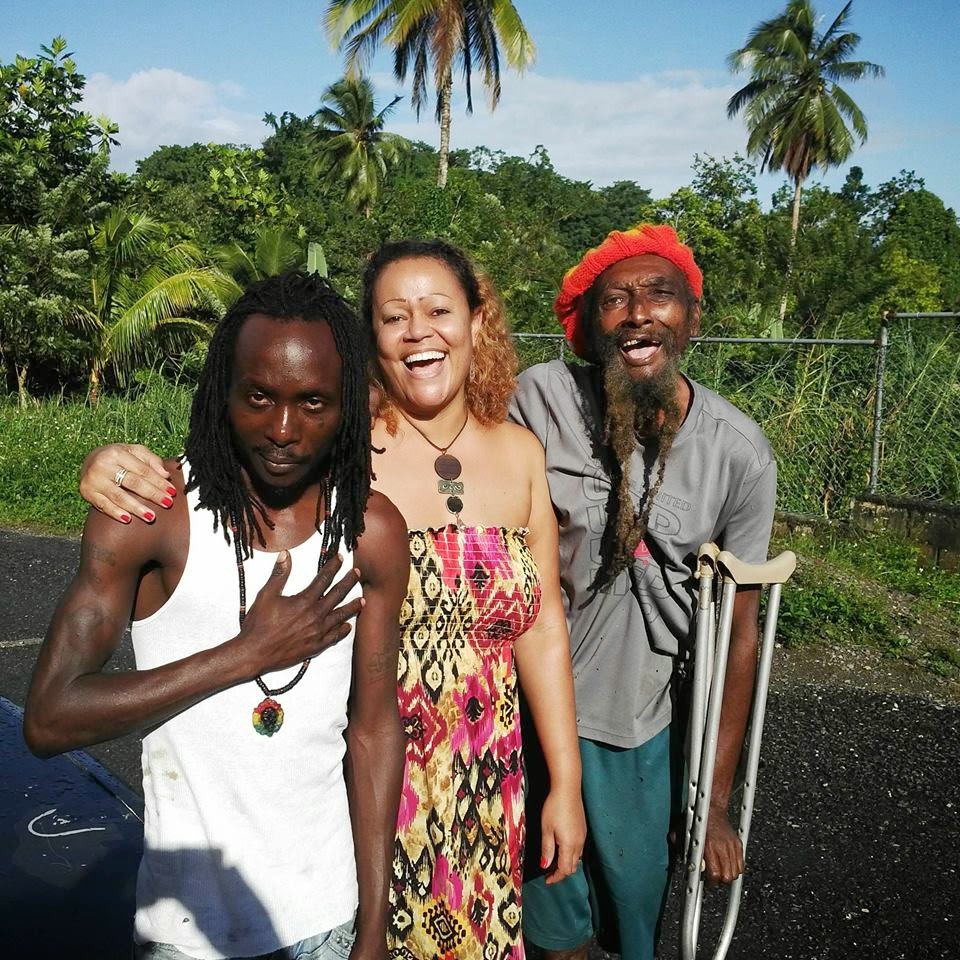 |
| From L-R: Cultural, Me and Johnnie Walker |
Johnnie wanted to arrange a jam session right there and then. But we had to get going. We parted as friends, planning the next time we’d see each other. We drove off in silence, each of us locked in our own thoughts I suppose. I was trying to work out in my own mind why I was impacted the way I was by this encounter. Afterall, Johnnie and his group aren’t internet sensations nor are they known locally. The most watched vignette in the series has at best a few thousand hits. A large part of my own experience that #SundayinPortland had to do with H’s own experience as I observed it. For my part, I was impacted by the authenticity of the interactions and the genuineness of every memeberof the group that we met.
H eventually explained to me the meaning behind the name. Johnnie insists that what we term as disappointments in life really are not. Once you have life, Johnnie opines, you have everything. This is his and his group’s underlying philosophy: eternal optimism and gratitude for each new day. They live off the land, and live at one with the land. They love music and they choose to spread their message through music. The song that had touched H, and I when I heard the recording, I remembered H singing constantly over the past week was this:
“Climbing from the bottom, straight to the top, we ah go reach top spot.” A simple song with a very strong, clear, positive message about life and living.
USA based saxophonist Henry Douglas Jr., was also deeply impacted by their music and ended up playing on some of their recordings. He too speaks about their soul, and the organic feel to their music.
They live off and with the land taking only what is needed at the particular point in time.
Start here in the
Reggae in the Ruff videos for the
Johnnie Walker and the Disappointers back story and for more on what they do and why they do it. Visit their
Facebook page. This is Jamaica at its best: unspoilt, uninfluenced and authentic. Portland continues to remind me of every single thing that is great about Jamaica, Land we Love.








